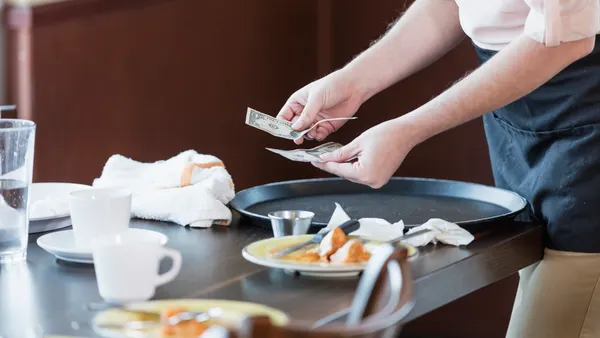Dive Brief:
- Starbucks China's comparable stores sales fell 78% during February, a direct result of temporary store closures due to the outbreak of COVID-19, or the novel coronavirus, Starbucks reported in a letter to shareholders. As a result of the disruption, the company expects that comparable store sales in China for Q2 will be down 50%, translating to a revenue loss of $400 to $430 million for the period.
- These estimates are based on Starbucks' assumption that all China stores will be open by the end of the quarter and traffic will improve. In the last fiscal week of February, average daily transactions rose 6% and total weekly gross sales in the market increased 80% after stores were reopened. More than 90% of Starbucks stores are currently open in China and operating under increased safety protocols, and the company predicts 95% of China stores will be open by the end of Q2. Over the last week, mobile orders made up 80% of Starbucks China's sales mix.
- Temporary safety protocols include limited lobby service, minimal cafe seating and taking advantage of mobile ordering to ensure contactless service through pickup and delivery. The majority of Starbucks China stores have restricted hours of operation due to low customer traffic and varying public health restrictions in different provinces, and some only offer delivery. Stores in high-risk areas such as hospitals and universities are still temporarily closed, mainly in the Hubei province, where the COVID-19 outbreak was first reported.
Dive Insight:
Starbucks also stated in its letter that there is no sign that COVID-19 is impacting its U.S. business performance, which drove 65% of consolidated revenues for Q1 2020. Still, the company said it is prepared to respond to coronavirus-related issues in any of its markets thanks to the operational insights its gained after dealing with the virus' aftermath in China. More than 200 novel coronavirus cases and 12 related deaths have been reported across the country as of Wednesday, according to the Washington Post.
These insights have led to the following safety measures, according to the letter:
- All partners must undergo daily temperature checks and have been provided with masks that must be worn at all times.
- Every Starbucks store entrance is set up with a “safety station” to check each customer’s temperature and ensure they wear masks before entering.
- The “Contactless Starbucks Experience” has been introduced to avoid direct contact between partners and customers.
- Enhanced café sanitizing protocols have been implemented.
- Café seating is limited to maintain a safe distance between each customer.
Starbucks also continued to pay hourly employees for hours that were scheduled prior to store closures but were not actually worked. Employees in need of special financial assistance were granted a partial payment in advance for hours that they committed to work in the future, and Starbucks provided counseling for workers in China and their family members amid the outbreak.
Some of these safety measures have already been implemented in Seattle-area stores, since the state of Washington has experienced the brunt of the U.S.-based outbreak. Starbucks sent a letter to Seattle employees this week with instructions for frequent café cleaning, including regularly sanitizing door handles, chairs, tables, bathrooms and ordering machines, the Journal reports. Starbucks said cleaning would take about a half hour and should be carried out during peak hours, per the Journal. Workers were also urged to wash their hands regularly.
As of Wednesday, Starbucks will no longer accept customers' personal cups or use "for here" cups and servingware in its stores nationwide, according to a company statement. It will, however, still give diners that bring in their own beverage container or request "for here" cups a 10-cent discount.
Starbucks isn't alone in rolling out extra safety precautions stateside. McDonald's has also instructed its employees to clean door handles, self-order kiosks, counters and bathrooms more often, and recommended that restaurants make hand sanitizer available for diners in the lobby and staff behind the counter. The burger chain also formed an internal group in January to assess daily the impact of COVID-19 on its worldwide operations.
These major chains will no doubt set the standard for coronavirus precautions at restaurants around the U.S., but these measures may only be as good as a company's sick leave policy is. Many restaurants do not pay their employees for days they stay home due to illness, which could result in infected workers continuing to clock in at restaurants, increasing the outbreak's spread. Starbucks does offer paid sick leave for its employees, but this is an exception to the industry's norm.












